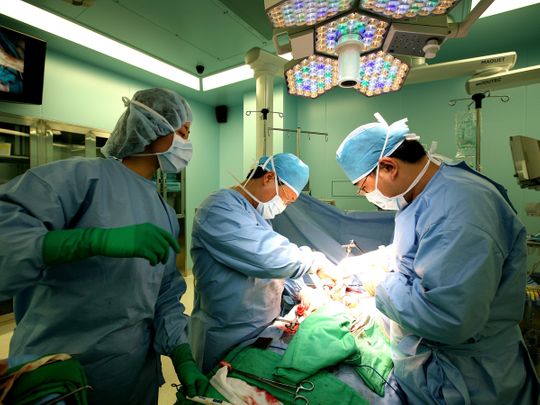
What are the key strengths of Korea’s healthcare system?
The key strengths of Korea’s healthcare system include the national health insurance system, abundant medical infrastructure and excellent medical personnel, and the accreditation system of medical facilities.
Korea’s national health insurance system is a public and single payer system. Based on the transparent management and high-tech IT system, Health Insurance Review & Assessment Service (HIRA), a government entity, has created the world’s best health insurance system where citizens receive high quality medical service with affordable cost. We have the strengths of abundant medical infrastructure above the OECD average as well as excellent medical personnel, built by the entry of the best students into medical schools.
And last, but not least, the government operates accreditation systems that evaluate patient safety and medical services to increase credibility and enhance service quality. One of such systems specifically targets hospitals that serve foreign patients and designates those qualified in patient safety, medical and non-medical services.
Could you give us an idea on the number of foreign patients Korean hospitals handled in the past few years? How many patients from the UAE travelled to Korea for medical treatment last year?
The number of foreign patients has increased from 296,889 in 2015 to 497,464 in 2019. Last year, 8,983 patients came from the Middle East and 4,089 from the UAE, accounting for 45.6 per cent.
What kind of cost advantage does Korea offer for medical procedures when compared with countries in Europe and the US?
Due to lack of research about medical cost comparison by country, it is hard to estimate accurate cost advantage Korea could offer, but Korea tends to have cost advantages compared to the US.
According to an article published in Health Communication in 2015, 12 major surgeries, including heart bypass, angioplasty, and heart valve replacement, are offered at a price two to eight times lower than in the US. For example, it shows heart bypass costs $28,900 (Dh106,135) in Korea, which is five times cheaper than $144,000 in the US.
However, lower costs are not associated with poor health outcomes in Korea. For example, as of 2019, five-year survival rates for organ transplant and cancer appeared 82.7 per cent and 70.6 per cent respectively, which are almost similar to those in the US.
What are the key areas of cooperation in health between the UAE and Korea?
Since its establishment in Abu Dhabi in 2012, Korea Health Industry Development Institute (KHIDI) has attracted foreign patients and supported overseas expansion of Korean medical institutions by establishing a network with local government authorities and organisations in the Middle East and Africa.
The key areas of cooperation in health between the UAE and Korea can be medical tourism, hospital operation, and provision of medical devices. These include treatment of government-funded patients, the consignment operation of Sheikh Khalifa Specialty Hospital (SKSH), and cooperation in K-prevention such as emergency provision of Korean diagnostic kits and clinical virus transport medium (CTM).

In 2020, through cooperation between the Embassy of the Republic of Korea in the UAE and KHIDI Abu Dhabi, emergency provision of Korean diagnostic kits and CTM were made to tackle the Covid-19 crisis. Additionally, in accordance with K-prevention cooperation, there have been various cooperation such as provision of Korean medical equipment and humanitarian assistance.
KHIDI signed the contracts in medical services with Department of Health Abu Dhabi (DOH) in 2011 and the UAE Armed Forces in 2013. Until the end of 2019, the total number of 5,451 government-funded UAE patients visited Korea for medical treatments, based on those contracts. The number of government-funded patients recorded the second highest, following the US. Annually about 1,000 government-funded patients from the UAE visit Korean medical facilities.
Since August 2014, Seoul National University Hospital (SNUH) has been operating SKSH, a 248 bed tertiary hospital in Ras Al Khaimah. In 2019, SNUH and the UAE Presidential office signed the renewal of the consignment operation agreement for SKSH for an additional five years. SKSH has been offering high quality medical service to citizens of the northern emirates, and will continue to promote Korean medical service in the country.
In 2020, through cooperation between the Embassy of the Republic of Korea in the UAE and KHIDI Abu Dhabi, emergency provision of Korean diagnostic kits and CTM were made to tackle the Covid-19 crisis. Additionally, in accordance with K-prevention cooperation, there have been various cooperation such as provision of Korean medical equipment and humanitarian assistance.
Please share some details on SEHA’s recent agreement with KHIDI on healthcare cooperation?
KHIDI has been working closely with SEHA since 2012. Earlier this year, KHIDI and SEHA held a joint conference called Korean Medicine Seminar, and cooperated for the emergency provision of Covid-19 medical device.
Main areas of cooperation, as stated in the MoU, are medical training, clinical research, medical tourism, provision of medical services, supply chain management, and technical support, especially in areas of AI, IoT, and cloud.
What initiatives has KHIDI taken to promote Korea’s healthcare facilities in the UAE and attract more patients to Korea?
To promote excellence of Korean medicine for the treatment of patients with severe diseases, such as cancer, transplantation and musculoskeletal disorders, KHIDI has been holding academic conferences in conjunction with the UAE’s local authorities and medical associations. I believe these efforts have contributed to facilitating the exchange of medical professionals as well.
KHIDI also has built and maintained close network with local authorities including DOH and UAE Armed Forces. In addition, to take good care of government-funded patients, KHIDI has provided as much support as possible, so that hospitals can offer Muslim prayer rooms, halal food, Korean Arabic translation, and so on.
How did Korea control coronavirus outbreak without shutting everything down?
Since the outbreak of MERS in 2015, Korea has taken several initiatives to respond to infectious diseases at the national level. The Korea Center for Disease Control and Prevention was reorganised as an independent agency and the number of negative pressure isolation rooms by region was secured. In response to Covid-19 pandemic, Korea has implemented the 3T strategies — Test, Trace and Treat.
For precise and rapid diagnosis of Covid-19, the development of diagnostic kits and emergency approval of those kits have been supported. Also, large-scale innovative diagnostic tests, such as drive-through and walk-through, were used to respond to a large-scale outbreak. The epidemiological investigation of confirmed cases has been conducted to prevent regional spread.
Utilising national health insurance and operating Residential Treatment Centers for asymptomatic patients and patients with mild symptoms, Korea has not only lowered age-specific mortality but also prevented a breakdown of the medical system. Additionally, voluntary participation of citizens in the Five-day Rotation Face Mask Distribution System and social distancing have made the crisis manageable.
Finally, how are the UAE and Korea cooperating to mitigate the challenges of coronavirus outbreak?
In order to prevent the spread of Covid-19, Korea wants to share the K-prevention model with the UAE.
If the two countries establish a communication channel that can continue to discuss quarantine polices, ranging from crisis response strategies to diagnosis, isolation and epidemiological investigations, treatment and related matters, the UAE and Korea will be able to respond more quickly and systemically.
The ultimate end to infectious diseases such as Covid-19 requires the development of vaccines or treatments. However, it takes a long time from development to mass-production, so international cooperation and solidarity, such as investment cooperation and joint research with Korea and the UAE, are essential.
I also believe that more opportunities to interact more freely and actively should be given to experts in healthcare sector in the two countries.













